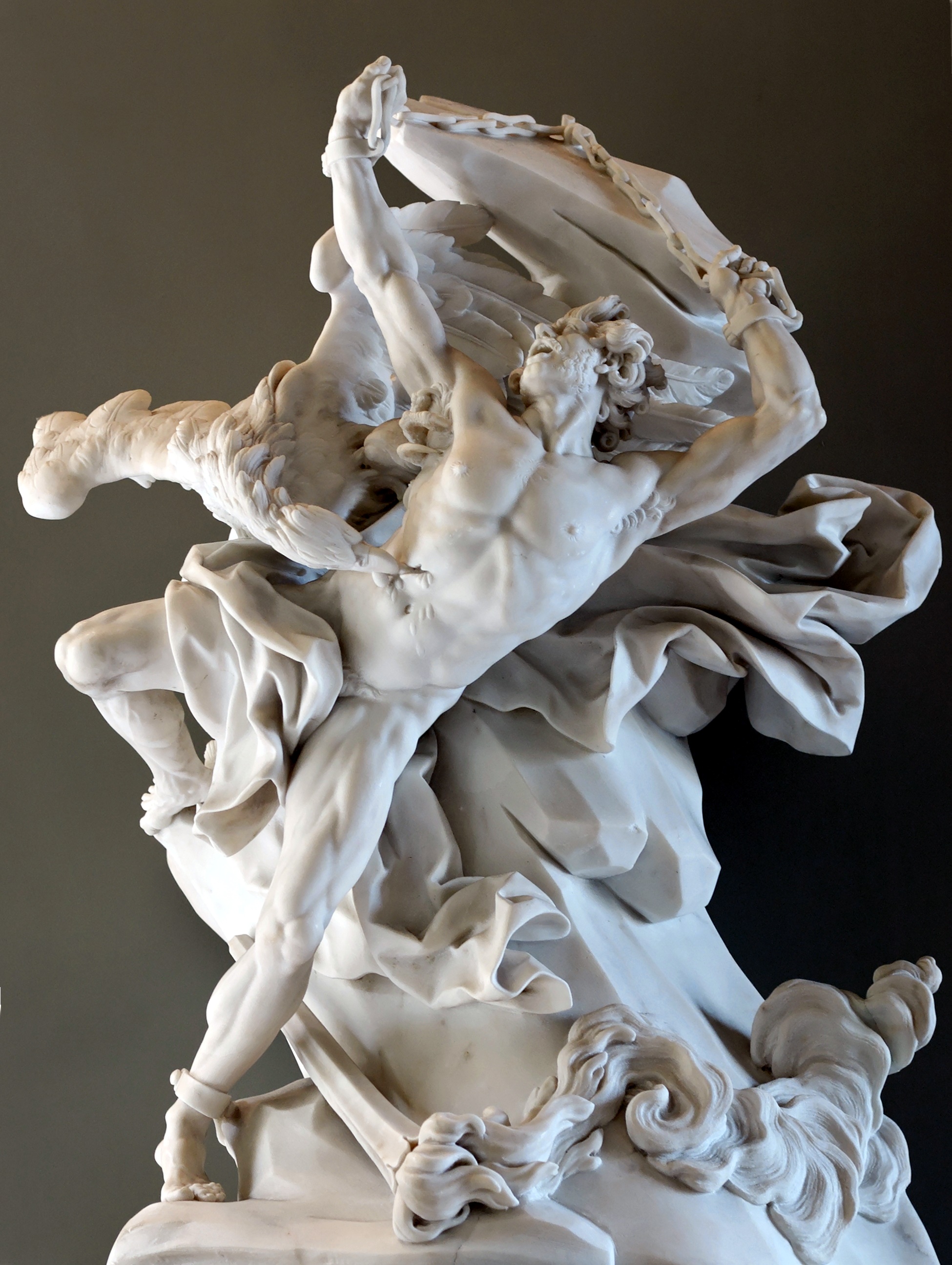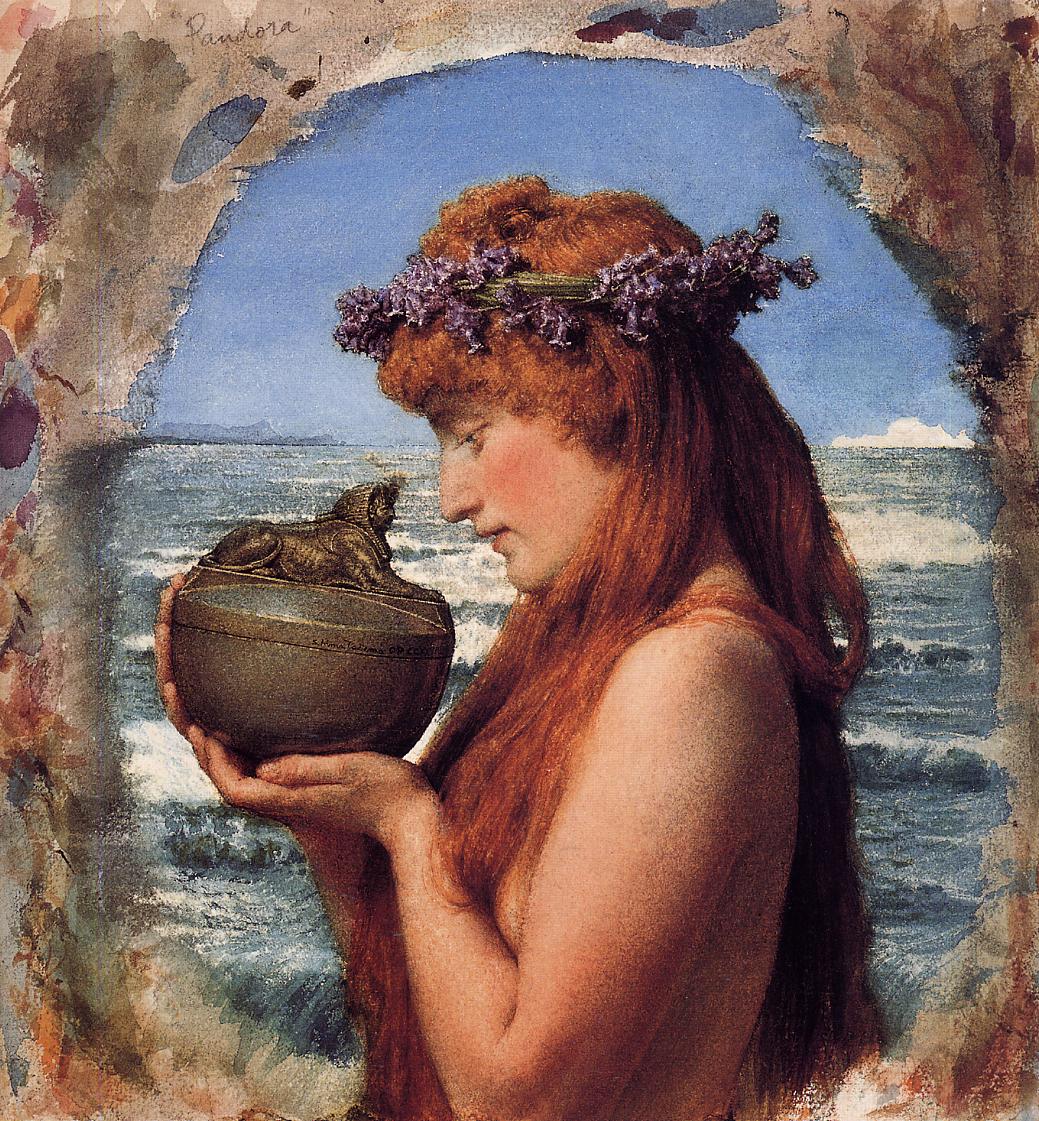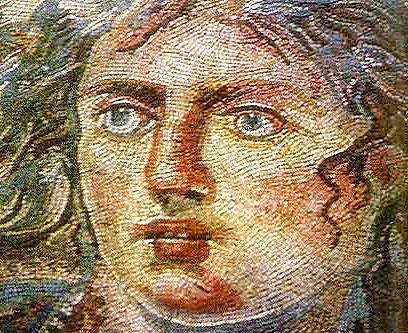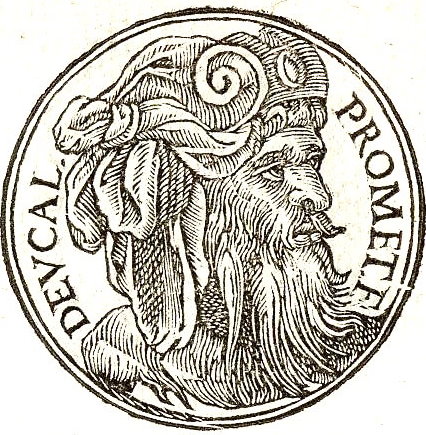|
Epimetheus
In Greek mythology, Epimetheus (; ) is the brother of Prometheus, the pair serving "as representatives of mankind". Both sons of the Titan Iapetus, while Prometheus ("foresight") is ingeniously clever, Epimetheus ("hindsight") is inept and foolish. In some accounts of the myth, Epimetheus unleashes the unforeseen troubles in Pandora's box. Mythology According to Plato's use of the old myth in his '' Protagoras'' (320d–322a), the two Titan brothers were entrusted with distributing the traits among the newly created animals. Epimetheus was responsible for giving a positive trait to every animal, but when it was time to give man a positive trait, lacking ''foresight'' he found that there was nothing left. Prometheus decided that humankind's attributes would be the civilising arts and fire, which he stole from Athena and Hephaestus. Prometheus later stood trial for his crime. In the context of Plato's dialogue, "Epimetheus, the being in whom thought follows production, represents ... [...More Info...] [...Related Items...] OR: [Wikipedia] [Google] [Baidu] |
Prometheus
In Greek mythology, Prometheus (; , , possibly meaning "forethought")Smith"Prometheus". is a Titans, Titan. He is best known for defying the Olympian gods by taking theft of fire, fire from them and giving it to humanity in the form of technology, knowledge and, more generally, civilization. In some versions of the myth, Prometheus is also credited with the Creation of life from clay, creation of humanity from clay. He is known for his intelligence and for being a champion of mankind and is also generally seen as the author of the human arts and sciences. He is sometimes presented as the father of Deucalion, the hero of the flood story. The punishment of Prometheus for stealing fire from Olympus and giving it to humans is a subject of both ancient and Prometheus in popular culture, modern culture. Zeus, king of the Olympian gods, condemned Prometheus to eternal torment for his transgression. Prometheus was bound to a rock, and an eagle—the emblem of Zeus—was sent to eat hi ... [...More Info...] [...Related Items...] OR: [Wikipedia] [Google] [Baidu] |
Pandora's Box
Pandora's box is an artifact in Greek mythology connected with the myth of Pandora in Hesiod's c. 700 B.C. poem ''Works and Days''. Hesiod related that curiosity led her to open a container left in the care of her husband, thus releasing curses upon mankind. Later depictions of the story have been varied, with some literary and artistic treatments focusing more on the contents than on Pandora herself. The container mentioned in the original account was actually a large storage jar, but the word was later mistranslated. In modern times an idiom has grown from the story meaning "Any source of great and unexpected troubles", or alternatively "A present which seems valuable but which in reality is a curse". In mythology According to Hesiod, when Prometheus stole fire from heaven, Zeus, the king of the gods, took vengeance by presenting Pandora to Prometheus' brother Epimetheus. Pandora opened a jar left in her care containing sickness, death and many other unspecified evils which ... [...More Info...] [...Related Items...] OR: [Wikipedia] [Google] [Baidu] |
Pandora
In Greek mythology, Pandora was the first human woman created by Hephaestus on the instructions of Zeus. As Hesiod related it, each god cooperated by giving her unique gifts. Her other name—inscribed against her figure on a white-ground '' kylix'' in the British Museum—is Anesidora (), "she who sends up gifts" (''up'' implying "from below" within the earth). The Pandora myth is a kind of theodicy, addressing the question of why there is evil in the world, according to which, Pandora opened a jar ('' pithos''; commonly referred to as " Pandora's box") releasing all the evils of humanity. It has been argued that Hesiod's interpretation of Pandora's story went on to influence both Jewish and Christian theology and so perpetuated her bad reputation into the Renaissance. Later poets, dramatists, painters and sculptors made her their subject. Hesiod Hesiod, both in his ''Theogony'' (briefly, without naming Pandora outright, line 570) and in ''Works and Days'', gives the earliest ... [...More Info...] [...Related Items...] OR: [Wikipedia] [Google] [Baidu] |
Iapetus
In Greek mythology, Iapetus (; ; ), also Japetus, is a Titan, the son of Uranus and Gaia and father of Atlas, Prometheus, Epimetheus, and Menoetius. He was also called the father of Buphagus and Anchiale in other sources. Iapetus was linked to Japheth (), one of the sons of Noah and a progenitor of mankind in biblical accounts. The practice by early historians and biblical scholars of identifying various historical nations and ethnic groups as descendants of Japheth, together with the similarity of their names, led to a fusion of their identities, from the early modern period to the present. Mythology Iapetus is the one Titan mentioned by Homer in the ''Iliad'' as being in Tartarus with Cronus. He is a brother of Cronus, who ruled the world during the Golden Age but is now locked up in Tartarus along with Iapetus, where neither breeze nor light of the sun reaches them. Iapetus' wife is usually described as a daughter of Oceanus and Tethys named either Clymene (according t ... [...More Info...] [...Related Items...] OR: [Wikipedia] [Google] [Baidu] |
Theogony
The ''Theogony'' () is a poem by Hesiod (8th–7th century BC) describing the origins and genealogy, genealogies of the Greek gods, composed . It is written in the Homeric Greek, epic dialect of Ancient Greek and contains 1,022 lines. It is one of the most important sources for the understanding of early Greek cosmology. Descriptions Hesiod's ''Theogony'' is a large-scale synthesis of a vast variety of local Greece, Greek traditions concerning the gods, organized as a narrative that tells how they came to be and how they established permanent control over the cosmos. It is the first known Greece, Greek mythical cosmogony. The initial state of the universe is Chaos (mythology), chaos, a dark indefinite void considered a divine primordial condition from which everything else appeared. Theogonies are a part of Greek mythology which embodies the desire to articulate reality as a whole; this universalizing impulse was fundamental for the first later projects of speculative theorizing ... [...More Info...] [...Related Items...] OR: [Wikipedia] [Google] [Baidu] |
Titans
In Greek mythology, the Titans ( ; ) were the pre-Twelve Olympians, Olympian gods. According to the ''Theogony'' of Hesiod, they were the twelve children of the primordial parents Uranus (mythology), Uranus (Sky) and Gaia (Earth). The six male Titans were Oceanus, Coeus, Crius, Hyperion (Titan), Hyperion, Iapetus, and Cronus; the six female Titans—called the Titanides () or Titanesses—were Theia, Rhea (mythology), Rhea, Themis, Mnemosyne, Phoebe (Titaness), Phoebe, and Tethys (mythology), Tethys. After Cronus mated with his older sister Rhea, she bore the first generation of Olympians: the six siblings Zeus, Hades, Poseidon, Hestia, Demeter, and Hera. Certain other descendants of the Titans, such as Prometheus, Atlas (mythology), Atlas, Helios, and Leto, are sometimes also called Titans. The Titans were the former gods: the generation of gods preceding the Twelve Olympians#Olympians, Olympians. They were overthrown as part of the Greek succession myth, which tells how Cron ... [...More Info...] [...Related Items...] OR: [Wikipedia] [Google] [Baidu] |
Tethys (mythology)
In Greek mythology, Tethys (; ) was a Titans, Titan daughter of Uranus (mythology), Uranus and Gaia (mythology), Gaia, a sister and wife of the Titan Oceanus, and the mother of the River gods (Greek mythology), river gods and the Oceanids. Although Tethys had no active role in Greek mythology and no established cults, she was depicted in mosaics decorating baths, pools, and triclinium, triclinia in the Greek East, particularly in Antioch and its suburbs, either alone or with Oceanus. Genealogy Tethys was one of the Titan offspring of Uranus (Sky) and Gaia (Earth). Hesiod lists her Titan siblings as Oceanus, Coeus, Crius, Hyperion (mythology), Hyperion, Iapetus (mythology), Iapetus, Theia, Rhea (mythology), Rhea, Themis, Mnemosyne, Phoebe (Titaness), Phoebe, and Cronus. Tethys married her brother Oceanus, an enormous river encircling the world, and was by him the mother of numerous sons (the River gods (Greek mythology), river gods) and numerous daughters (the Oceanids). Accordi ... [...More Info...] [...Related Items...] OR: [Wikipedia] [Google] [Baidu] |
Pyrrha
In Greek mythology, Pyrrha (; ) was the daughter of Epimetheus and Pandora and wife of Deucalion of whom she had three sons, Hellen, Amphictyon, Orestheus; and three daughters Protogeneia, Pandora and Thyia. According to some accounts, Hellen or Helmetheus was credited to be born from Pyrrha's union with Zeus. Etymology In Latin, the word ''pyrrhus'' means red from the Greek adjective πυρρός, ''purrhos'', meaning "flame coloured", or simply "red", referring in particular to people with red hair, as Pyrrha is described by both Horace and Ovid. Mythology When Zeus decided to end the Bronze Age with the great deluge, Pyrrha and her husband, Deucalion, were the only survivors. Even though he was imprisoned, Prometheus who could see the future and had foreseen the coming of this flood, told his son, Deucalion, to build an ark and, thus, they survived. During the flood, they landed on Mount Parnassus, the only place spared by the flood. Once the deluge was over ... [...More Info...] [...Related Items...] OR: [Wikipedia] [Google] [Baidu] |
Clymene (wife Of Iapetus)
In Greek mythology, Clymene or Klymene (; , ''Kluménē'', feminine form of Κλύμενος, meaning "famous") is the name of one of the three thousand Oceanid nymphs, usually the wife of Iapetus and mother by him of Prometheus, Epimetheus, Atlas and Menoetius. Mythology Clymene is the daughter of the Titans Oceanus and Tethys. She married her uncle Iapetus and became by him the mother of Prometheus, Epimetheus, Atlas and Menoetius. Other authors relate the same of her sister Asia. A less common genealogy makes Clymene the wife of Prometheus and the mother of Deucalion by him. She may also be the Clymene referred to as the mother of Mnemosyne by Zeus. In some myths, Clymene was one of the nymphs in the train of Cyrene. Although she shares name and parentage with Clymene, one of Helios's lovers, who is also a daughter of Oceanus and Tethys (and thus one of her sisters and fellow Oceanid), she is distinguished from her.Hard Robin, pg44/ref> Genealogy ... [...More Info...] [...Related Items...] OR: [Wikipedia] [Google] [Baidu] |
Atlas (mythology)
In Greek mythology, Atlas (; , ''Átlās'') is a Titans, Titan condemned to hold up the heavens or sky for eternity after the Titanomachy. Atlas also plays a role in the myths of two of the greatest Hero#Antiquity, Greek heroes: Heracles (Hercules in Roman mythology) and Perseus. According to the ancient Greek poet Hesiod, Atlas stood at the ends of the earth in the extreme Hesperides, west. Later, he became commonly identified with the Atlas Mountains in northwest Africa and was said to be the first King of Mauretania (modern-day Morocco and west Algeria, not to be confused with the modern-day country of Mauritania). Atlas was said to have been skilled in philosophy, mathematics, and astronomy. In antiquity, he was credited with inventing the first celestial spheres, celestial sphere. In some texts, he is even credited with the invention of astronomy itself. Atlas was the son of the Titan Iapetus and the Oceanids, Oceanid Asia (Oceanid), Asia or Clymene (wife of Iapetus), Clym ... [...More Info...] [...Related Items...] OR: [Wikipedia] [Google] [Baidu] |
Protagoras (dialogue)
''Protagoras'' ( ; ) is a dialogue by Plato. The traditional subtitle (which may or may not be Plato's) is "or the Sophists". The main argument is between Socrates and the elderly Protagoras, a celebrated sophist and philosopher. The discussion takes place at the home of Callias III, Callias, who is host to Protagoras while he is in town. The philosophy, philosophical issues raised in the ''Protagoras'' include the unity and the teaching, teachability of virtue, and the relationship between pleasure and goodness.Taylor, C. C. W.Review of (N.) Denyer, "Plato, Protagoras". Cambridge: Cambridge University Press, 2008 p. 275, published on 19 November 2010, accessed on 15 January 2025 The characters Of the twenty-one people who are specifically said to be present, three are known sophists. In addition to Protagoras himself, there are Hippias of Elis and Prodicus of Ceos. Two of the sons of Pericles are said to be there, Paralus and Xanthippus. With the exception of Aristophanes, all ... [...More Info...] [...Related Items...] OR: [Wikipedia] [Google] [Baidu] |
Deucalion
In Greek mythology, Deucalion (; ) was the son of Prometheus; ancient sources name his mother as Clymene (mythology), Clymene, Hesione (Oceanid), Hesione, or Pronoia (mythology), Pronoia.A Scholia, scholium to ''Odyssey'' 10.2 (=''Catalogue of Women, Catalogue'' fr. 4) reports that Hesiod called Deucalion's mother "Pryneie" or "Prynoe", corrupt forms which Karl Wilhelm Dindorf, Dindorf believed to conceal Pronoea's name. The emendation is considered to have "undeniable merit" by A. Casanova (1979) ''La famiglia di Pandora: analisi filologica dei miti di Pandora e Prometeo nella tradizione esiodea''. Florence, p. 145. He is closely connected with a flood myth in Greek mythology. Etymology According to folk etymology, Deucalion's name comes from , ''deukos'', a variant of , ''gleucos'', i.e. "sweet new wine, must, sweetness" and from , ''haliéus'', i.e. "sailor, seaman, fisher". His wife Pyrrha's name derives from the adjective , -ά, -όν, ''pyrrhós, -á, -ón'', i.e. "flame- ... [...More Info...] [...Related Items...] OR: [Wikipedia] [Google] [Baidu] |








